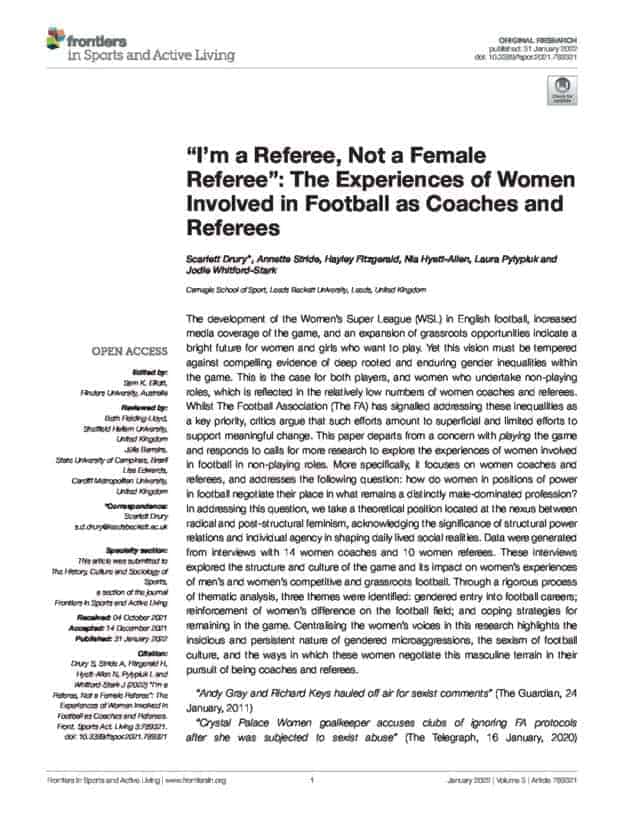Abstract
The development of the Women’s Super League (WSL) in English football, increased media coverage of the game, and an expansion of grassroots opportunities indicate a bright future for women and girls who want to play. Yet this vision must be tempered against compelling evidence of deep rooted and enduring gender inequalities within the game. This is the case for both players, and women who undertake non-playing roles, which is reflected in the relatively low numbers of women coaches and referees. Whilst The Football Association (The FA) has signalled addressing these inequalities as a key priority, critics argue that such efforts amount to superficial and limited efforts to support meaningful change. This paper departs from a concern with playing the game and responds to calls for more research to explore the experiences of women involved in football in non-playing roles. More specifically, it focuses on women coaches and referees, and addresses the following question: how do women in positions of power in football negotiate their place in what remains a distinctly male-dominated profession? In addressing this question, we take a theoretical position located at the nexus between radical and post-structural feminism, acknowledging the significance of structural power relations and individual agency in shaping daily lived social realities. Data were generated from interviews with 14 women coaches and 10 women referees. These interviews explored the structure and culture of the game and its impact on women’s experiences of men’s and women’s competitive and grassroots football. Through a rigorous process of thematic analysis, three themes were identified: gendered entry into football careers; reinforcement of women’s difference on the football field; and coping strategies for remaining in the game. Centralising the women’s voices in this research highlights the insidious and persistent nature of gendered microaggressions, the sexism of football culture, and the ways in which these women negotiate this masculine terrain in their pursuit of being coaches and referees.
- “Andy Gray and Richard Keys hauled off air for sexist comments” (The Guardian, 24 January, 2011)
- “Crystal Palace Women goalkeeper accuses clubs of ignoring FA protocols after she was subjected to sexist abuse” (The Telegraph, 16 January, 2020)
- “Football manager demands ban on women referees” (The Guardian, 12 November, 2006)
- “Richard Scudamore sexism scandal intensifies as conspirator in sexist emails investigated by own law firm” (The Telegraph, 16 May, 2014)
- “Soccer chief’s plan to boost women’s game? Hotpants” (The Guardian, 16 January, 2004)
- “Women in Football survey a damning indictment of sexism in the workplace” (HRreview, 11 March, 2014)
- “Clattenburg criticised for claim female referees must pick career or children” (The Telegraph, 1 October, 2021)



Responses